Learn the core traits of narcissism, how to recognize narcissists, and effective strategies for interacting with them.
Thank you for reading this post, don't forget to subscribe!Overcoming narcissism means recognizing the behavior and learning effective strategies to protect your mental health, set boundaries, and find enduring emotional balance.
Understanding Narcissism and Its Impact
Narcissism goes beyond vanity or self-absorption—it’s a deep psychological pattern shaping how a person sees themselves and interacts with others. People with narcissistic traits may seem charming or confident, but underneath lies a strong need for admiration and validation.
Narcissism can appear in varying degrees, from mild self-centeredness to the extreme form known as Narcissistic Personality Disorder (NPD). This behavior not only impacts the narcissist but also deeply affects those around them—partners, family, friends, and coworkers.
Relationships with narcissists may begin with admiration but may quickly turn toxic. Their lack of empathy and manipulative behaviors create significant emotional turmoil. Understanding narcissism is crucial to healing and learning how to respond effectively.
What is Narcissistic Personality Disorder?
The well-known mental illness known as narcissistic personality disorder (NPD) is typified by a lack of empathy, an incessant need for praise, and recurring grandiosity.
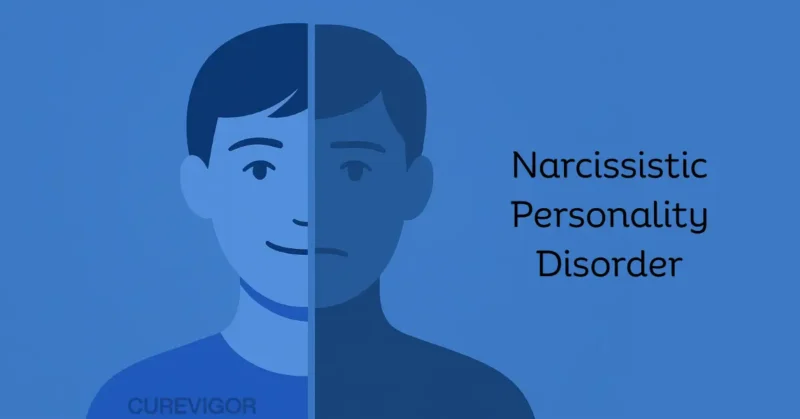
The Diagnostic and Statistical Manual of Mental Disorders (DSM-5) states that people with NPD frequently have inflated self-esteem, a sense of entitlement, and relationship-exploitative tendencies.
These individuals may believe they are superior and often disregard others’ boundaries. While everyone can have narcissistic traits occasionally, those with NPD experience them persistently, interfering with daily functioning and relationships.
Key Characteristics of Narcissistic Personality Disorder
- Grandiosity: An exaggerated feeling of superiority and self-importance.
- Entitlement: The conviction that they are entitled to particular advantages and treatment.
- Exploitation is the unrepentant use of others to further one’s own objectives.
- Lack of Empathy: The incapacity or reluctance to understand the emotions of others.
- Fragile Self-Esteem: Although narcissists seem self-assured, they are frequently quite insecure.
NPD often stems from a combination of genetic, environmental, and psychological factors. Childhood experiences—such as excessive praise or extreme criticism—can contribute to its development.
Even though self-awareness and therapy can help, many narcissists find it difficult to acknowledge that their behavior is harmful, which makes treatment difficult.
The Impact of Narcissism on Relationships
Narcissism doesn’t just affect the person who carries it—it ripples outward, often leaving emotional wreckage in its path.
Whether in romantic partnerships, friendships, family bonds, or professional environments, narcissistic behavior can quietly corrode trust, communication, and emotional safety.
The imbalance created by this dynamic often leaves others feeling confused, drained, and questioning their own worth.
At first, narcissists often appear magnetic. They can be charming, attentive, and even intoxicatingly confident. But over time, this initial allure gives way to control, manipulation, and emotional instability.
The very qualities that seemed so appealing—confidence, assertiveness, charisma—transform into arrogance, criticism, and domination.
1. Emotional Manipulation: The Narcissist’s Control Mechanism
Emotional manipulation lies at the heart of every toxic relationship with a narcissist. They use psychological tactics like gaslighting, blame-shifting, and the silent treatment to keep their victims emotionally dependent and confused.
For instance, a narcissistic partner might deny saying hurtful things, causing you to question your memory or perception of reality—a classic form of gaslighting.
They may twist your words, make you feel guilty for expressing boundaries, or accuse you of being “too sensitive.” These tactics chip away at your confidence and make you doubt your instincts.
This manipulation isn’t always overt; it can be subtle and insidious. Narcissists are skilled at alternating between affection and cruelty, keeping you emotionally off-balance.
One day, they shower you with praise; the next, they withdraw affection or lash out unexpectedly. This emotional rollercoaster creates a trauma bond—a powerful, confusing attachment that makes leaving incredibly difficult.
2. Loss of Self-Identity: The Slow Erosion of Self-Worth
Perhaps one of the most painful consequences of narcissistic abuse is the loss of self-identity. People who live or work with narcissists often begin to adjust their behavior just to keep the peace.
Over time, you may find yourself constantly apologizing, walking on eggshells, or second-guessing your every decision.
The narcissist’s constant need for admiration forces you into the role of a caregiver or cheerleader, neglecting your own needs in the process. Gradually, your sense of self-worth becomes tied to how well you meet their expectations.
The longer this pattern continues, the more disconnected you become from your own feelings, goals, and desires.
For many, reclaiming identity after such a relationship involves a process of rediscovery—learning to trust your intuition again, expressing your authentic emotions without fear, and recognizing that someone else’s approval doesn’t define your value.
3. Toxic Work Environments: When Narcissism Enters the Office
Narcissism doesn’t stop at home—it often shows up in workplaces, creating toxic professional environments. A narcissistic boss or coworker can make life miserable for those around them.
They might take credit for others’ accomplishments, manipulate situations to appear superior, or pit colleagues against one another to maintain dominance.
Because they thrive on admiration, narcissistic leaders often surround themselves with “yes-people” who feed their ego. They may punish anyone who challenges their authority or refuses to participate in their self-serving agenda.
This culture of fear and favoritism can stifle creativity, lower morale, and increase turnover rates.
Employees under narcissistic management frequently report feeling undervalued, anxious, and disempowered.
Recognizing such dynamics early and seeking support—whether through HR or external career counseling—can protect your mental health and career trajectory.
4. Emotional Exhaustion: Living in Constant Tension
Living or working with a narcissist is like living in a perpetual state of alert. Every word, expression, or action can be misinterpreted or used against you. This constant tension eventually leads to emotional and physical exhaustion.
You might find yourself feeling numb, disconnected, or perpetually anxious. Many survivors describe it as “emotional burnout.” Over time, chronic stress from narcissistic abuse can even manifest physically, contributing to headaches, insomnia, digestive issues, or weakened immunity.
The cyclical nature of narcissistic relationships compounds this exhaustion. Periods of affection and “love-bombing” alternate with devaluation and rejection, keeping you hopeful for change that rarely comes.
This emotional whiplash drains your energy and blurs your sense of reality, leaving you unsure where you stand.
Breaking this cycle requires conscious detachment—recognizing that no amount of love, patience, or logic can fix someone who refuses to acknowledge their own flaws.
Healing After Narcissistic Damage
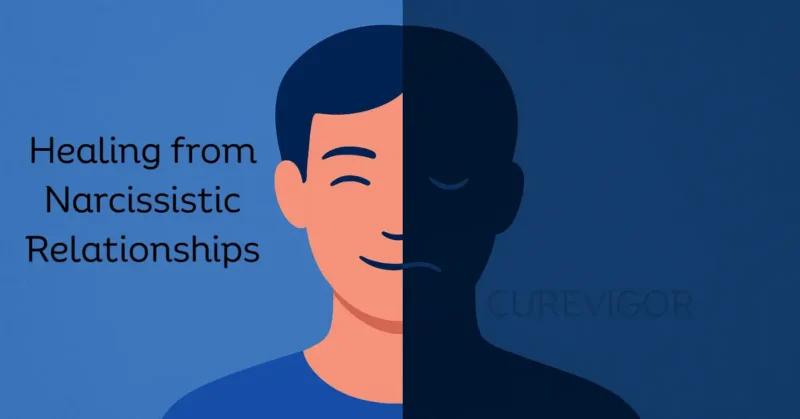
Recognizing these destructive patterns is the first and most crucial step toward healing. It’s not your fault if you’ve been caught in the narcissist’s web; their tactics are deliberately designed to confuse and control. What matters now is reclaiming your emotional independence.
Start by validating your experiences. Many survivors minimize their pain, but emotional abuse is real and damaging. Rebuilding self-trust, engaging in therapy, and reconnecting with people who genuinely care about your well-being are essential steps on the road to recovery.
By naming and understanding these behaviors, you take away their power. Once you see the pattern, you can begin to rewrite the story—one where you are no longer the victim, but the survivor who learned to rise above manipulation and rediscover peace.
Identifying Narcissistic Behavior
Recognizing narcissistic behavior isn’t always easy — at first, narcissists can appear confident, charming, and charismatic. They often know how to say exactly what others want to hear.
Yet over time, subtle inconsistencies emerge in how they treat people and respond to situations. What may start as confidence often reveals itself as control, superiority, and emotional coldness.
Early detection of these habits can save you from emotional injury and assist you in making wise relationship decisions. Narcissistic traits tend to repeat across different areas of life — romantic relationships, friendships, family interactions, and even professional settings.
Common Traits of a Narcissist
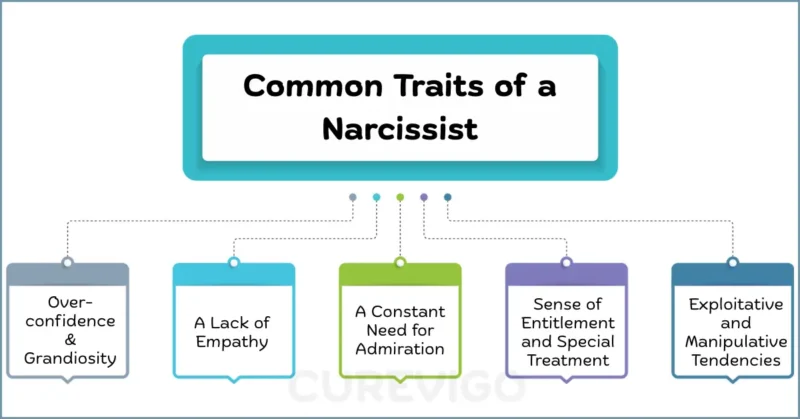
While not every person with narcissistic tendencies has Narcissistic Personality Disorder (NPD), many display recurring behavioral patterns that make healthy relationships difficult. Below are some of the most common narcissist signs to look out for:
1. Overconfidence and Grandiosity
Narcissists believe they are superior or more deserving than others. They often brag about achievements, exaggerate their success, or demand recognition even when it’s unwarranted.
For example, they might dominate conversations or turn any discussion back to themselves, dismissing others’ experiences as less significant.
2. A Lack of Empathy
Narcissists always lack empathy, which is the foundation of meaningful human interaction. They may appear indifferent to your feelings, offering little compassion when you’re upset.
Even when they pretend to care, it often feels shallow or self-serving. Their inability to see situations from another person’s perspective makes genuine intimacy nearly impossible.
3. A Constant Need for Admiration
Narcissists thrive on attention and validation. They might fish for compliments, exaggerate their hardships to gain sympathy, or grow irritated when others receive praise. This constant need to be admired fuels their self-image and helps them mask deep-rooted insecurity.
4. Sense of Entitlement and Special Treatment
They expect others to cater to their needs without reciprocation. Whether it’s cutting in line, ignoring rules, or expecting emotional labor from loved ones, they operate as if the world revolves around them.
When things don’t go their way, they may respond with anger, resentment, or manipulation.
5. Exploitative and Manipulative Tendencies
Narcissists often use people as tools to achieve their goals. They may charm, guilt, or intimidate others into doing what they want. Over time, this exploitation can leave victims feeling used and emotionally depleted.
How to Recognize Narcissistic Behavior
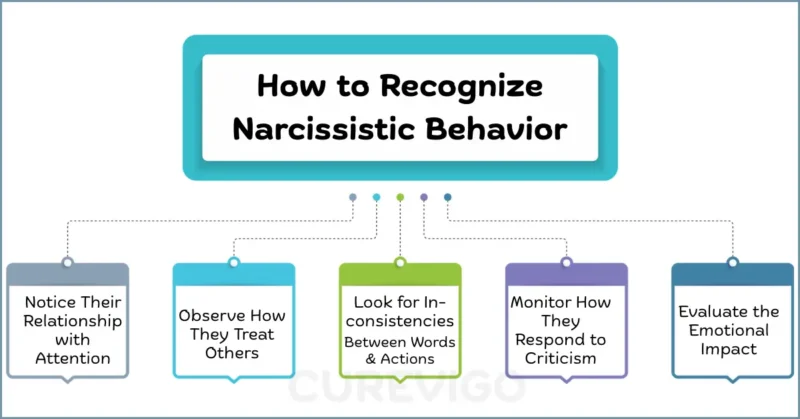
Identifying narcissism in everyday interactions requires careful observation, especially since narcissists are adept at masking their behavior early on. Here are a few ways to spot the signs more clearly:
1. Notice Their Relationship with Attention
Narcissists feed on admiration. Pay attention to how they behave when they’re not the center of attention — do they become irritated, dismissive, or attempt to redirect focus back to themselves? This craving for constant validation is one of the most visible red flags.
2. Observe How They Treat Others
Watch how they interact with people they don’t consider “important.” Narcissists often show exaggerated respect toward authority figures or those from whom they can benefit, yet display impatience or disdain toward service workers, subordinates, or family members.
This split behavior reveals their true character — kindness when it serves them, cruelty when it doesn’t.
3. Look for Inconsistencies Between Words & Actions
A classic hallmark of narcissism is hypocrisy. They might claim to value honesty but lie easily to maintain control. They’ll preach loyalty but betray trust when it’s convenient. Over time, their actions consistently fail to match their words.
4. Monitor How They Respond to Criticism
Narcissists struggle deeply with criticism, even when it’s constructive. A mild suggestion can trigger defensiveness, rage, or silent treatment. Instead of reflecting, they’ll shift blame, accuse others of jealousy, or claim to be the victim — anything to avoid accountability.
5. Evaluate the Emotional Impact
Sometimes the best indicator is how you feel after spending time with them. Do you often feel drained, anxious, or guilty for things you didn’t do? Narcissists subtly chip away at your confidence through manipulation and control. If interactions consistently leave you second-guessing yourself, it’s a sign of emotional toxicity.
The Hidden Side of Narcissism: Vulnerable Narcissists
Not all narcissists are loud or boastful. Some are vulnerable narcissists — outwardly insecure, introverted, or sensitive. They crave admiration but hide behind self-pity or victimhood to get it.
While they may appear humble, their underlying behavior still revolves around self-focus and emotional manipulation. Recognizing this subtype is essential because their tactics are often more brutal to detect but equally damaging.
Trusting Your Instincts
Perhaps the most powerful tool for identifying narcissistic behavior is trusting your intuition. Many people ignore red flags because narcissists can be persuasive and emotionally intense. However, your discomfort, confusion, or sense of walking on eggshells is a sign that something isn’t right.
Recognizing narcissism is not about labeling others — it’s about understanding patterns of behavior that impact your well-being. Awareness empowers you to respond wisely, protect your emotional boundaries, and choose relationships that foster mutual respect, empathy, and genuine connection.
Strategies for Dealing with Narcissists
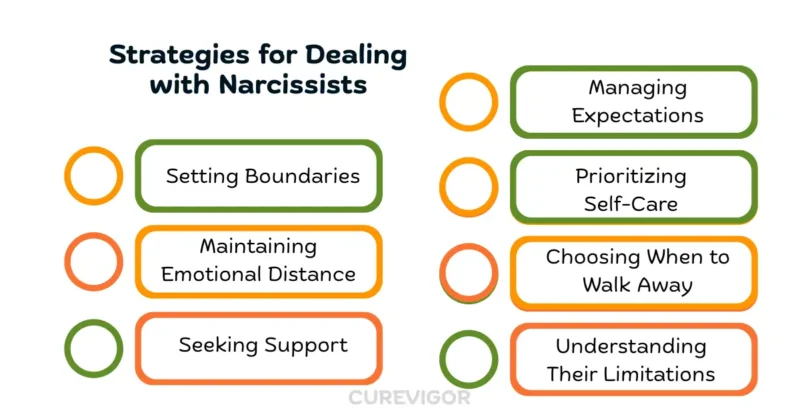
It can feel like a maze with no way out when you’re dealing with a narcissist. Their manipulation, charm, and emotional unpredictability make it difficult to maintain your sense of stability and peace.
Yet, with awareness and the right strategies, you can protect yourself from their influence while preserving your emotional health.
It’s important to understand that you cannot change a narcissist — no amount of love, patience, or logic will transform their behavior unless they themselves acknowledge the problem and seek treatment (which is rare).
Instead, your focus should be on self-protection, boundary setting, and emotional detachment.
Let’s explore some of the most effective and proven strategies for dealing with narcissists.
1. Setting Boundaries
Setting boundaries is not about confrontation — it’s about self-preservation. Narcissists thrive on control and will constantly test how much they can get away with. Without clear boundaries, they’ll invade your emotional, mental, and even physical space.
Boundaries define what you will and won’t tolerate. They are your line of emotional defense against manipulation. For instance:
- If a narcissist raises their voice or belittles you, calmly state, “I won’t continue this conversation if you’re yelling,” and walk away if it continues.
- If they constantly overstep your time, say: “I’m not available right now. Let’s talk when I’m free.”
Consistency is key. Narcissists will often push back, trying to guilt or confuse you into relaxing your boundaries. Stay firm — boundaries lose power when they’re inconsistently enforced.

Remember: boundaries are not rude; they’re acts of self-respect. Each time you stand your ground, you reclaim a piece of your autonomy.
2. Maintaining Emotional Distance
Emotional distance doesn’t mean cutting off compassion — it means protecting your mental space. Narcissists feed on emotional reactions; they use your anger, sadness, or frustration as fuel to keep the cycle of control alive. When you remain calm and detached, you deprive them of that power.
To practice emotional detachment:
- Respond, don’t react. Pause before answering. Short, calm responses limit their influence.
- Avoid emotional topics. Keep discussions factual or practical when necessary.
- Don’t share personal vulnerabilities. Narcissists may later weaponize them against you.
Sometimes, emotional distance may mean low contact or no contact, especially when the relationship is abusive. This can be difficult, particularly with family members or coworkers, but it’s often essential for long-term healing.
Detachment allows you to regain perspective and focus on your own needs instead of constantly managing theirs.
3. Seeking Support
When dealing with narcissists, isolation is one of their greatest weapons. They often make their victims doubt themselves, driving them away from friends or loved ones who might notice the truth. That’s why building a support system is vital.
Speak with family members, close friends, or a therapist who is knowledgeable about narcissistic abuse. Talking through your experiences helps you process emotions and validate your reality.
Support networks remind you that you’re not overreacting — you’re responding to consistent patterns of manipulation and disrespect.
Therapy can be potent. A trained professional can help you:
- Recognize manipulation and gaslighting in real time.
- Rebuild self-esteem damaged by emotional abuse.
- Develop coping mechanisms to stay grounded and assertive.
In the absence of face-to-face therapy, online forums and support groups can provide a secure setting for healing and experience sharing.
The National Domestic Violence Hotline (thehotline.org), which provides 24/7 confidential assistance to victims of emotional abuse, is a great resource.
4. Managing Expectations
One of the most brutal truths about dealing with narcissists is accepting that you can’t change them. They rarely admit fault or take accountability. Trying to reason with a narcissist often leads to more frustration and emotional exhaustion.
Instead, manage your expectations:
- Don’t expect empathy or fairness.
- Don’t look for closure or heartfelt apologies — they often won’t come.
- Accept that their behavior reflects them, not you.
Once you release the hope that they’ll suddenly change, you free yourself from the constant cycle of disappointment. You begin to prioritize your peace instead of their approval — and that’s where true healing begins.
5. Prioritizing Self-Care
Dealing with narcissists can be mentally and physically draining. It’s crucial to pour energy back into yourself — through self-care, hobbies, rest, and nurturing relationships with people who uplift you.
Self-care isn’t indulgent; it’s essential recovery work. Activities like journaling, meditation, and gentle exercise can help calm your nervous system and rebuild a sense of control.
Even small acts — spending time in nature, listening to music, or setting daily affirmations — remind you that you deserve peace and respect.
If you’ve spent a long time under the influence of a narcissist, rediscovering joy may take time. Be patient with yourself. Healing isn’t linear, but every day you choose self-respect over fear, you reclaim more of your power.
6. Choosing When to Walk Away
Sometimes, the healthiest boundary is complete separation. While it’s not always possible (for example, in co-parenting or work situations), in many cases, walking away from a narcissist is the most powerful statement of self-worth you can make.
Leaving doesn’t mean you’ve failed — it means you’ve recognized your value and chosen peace over chaos.
When preparing to step away:
- Make a safety plan if the narcissist is controlling or volatile.
- Cut off unnecessary communication channels (block or mute them if possible).
- Focus on rebuilding your life with supportive, empathetic people.
The first few weeks of distance may feel painful, but as time passes, the fog of manipulation lifts. You begin to rediscover your strength, clarity, and independence.
7. Understanding Their Limitations
It helps to remind yourself that narcissists operate from deep insecurity and fear of vulnerability. Their arrogance and manipulation are masks covering fragile self-esteem.
Understanding this doesn’t excuse their behavior, but it helps you detach emotionally and stop taking their cruelty personally.
When you recognize their outbursts as a reflection of their inner emptiness — not your worth — you begin to reclaim emotional power. Detachment and empathy for yourself (not for their behavior) become your strongest shields.
Final Thoughts on Dealing with Narcissists
Overcoming narcissism and learning how to deal with narcissists effectively is about reclaiming control over your own emotions and boundaries. It’s not about winning arguments or changing their mindset — it’s about refusing to play their game.
By staying grounded, protecting your emotional space, seeking support, and prioritizing your mental health, you shift the focus from their chaos to your healing. Remember, every time you say “no” to manipulation, you say “yes” to self-respect.
Healing from narcissistic relationships is a process, but it’s one of empowerment. With awareness and the right strategies, you can move forward — stronger, wiser, and completely free from the toxic pull of narcissistic influence.
FAQs
Q. What is narcissism in a person?
An exaggerated feeling of self-importance, a strong desire for adulation, and a lack of empathy for other people are characteristics of a narcissistic personality pattern. Narcissistic individuals often crave attention and validation to maintain their fragile self-esteem.
They tend to exaggerate their achievements and see themselves as superior. While confidence is healthy, narcissism crosses the line when self-interest harms others.
It often leaves those around them feeling invisible or emotionally drained, as the narcissist’s world revolves entirely around their own needs and desires.
Q. Can a narcissist love someone?
A narcissist can experience forms of affection or attachment, but their version of love is often conditional and self-serving. They may show care or passion when it benefits them, yet struggle to maintain empathy, compromise, or emotional depth — key components of genuine love.
Their relationships are usually built around control and admiration rather than mutual respect. While they may say “I love you,” it often reflects what the other person provides — validation, attention, or status — rather than a genuine emotional connection.
Authentic love requires empathy, which narcissists usually lack.
Q. What are the five main traits of a narcissist?
The five main traits of a narcissist include grandiosity, a need for admiration, a sense of entitlement, a lack of empathy, and manipulative behavior. Grandiosity fuels their belief in being exceptional, while their constant need for praise sustains their fragile ego.
They expect special treatment and often disregard others’ feelings or boundaries. Narcissists are also skilled at exploiting situations or people to meet their own goals.
When combined, these characteristics form a behavioral pattern that has the potential to significantly impact both personal and professional relationships.
Q. What does narcissus mean in a person?
A young man named Narcissus fell in love with his own reflection in a pool of water, hence the Greek mythological epithet “Narcissus.” In psychology, this myth inspired the term narcissism, symbolizing excessive self-focus and vanity.
When someone is described as a “narcissus,” it means they are self-absorbed, preoccupied with their image, and often indifferent to others’ emotions. It represents a person who seeks admiration but struggles to form genuine, compassionate relationships, valuing self-image over authenticity.
Q. Are narcissists mentally ill?
Narcissism exists on a spectrum — from mild personality traits to a diagnosable mental health condition known as Narcissistic Personality Disorder (NPD). When these behaviors become rigid, extreme, and disrupt daily functioning or relationships, they qualify as a mental illness under the DSM-5.
However, not every self-centered or vain person is mentally ill. Many narcissists function highly in society but struggle emotionally beneath their confident exterior.
Professional diagnosis and therapy are often needed for individuals with severe narcissistic patterns to develop self-awareness and healthier coping mechanisms.
Q. What is the root of narcissism?
The root of narcissism often lies in early childhood experiences that distort self-image and emotional regulation. Some narcissists develop from overindulgence — excessive praise or lack of boundaries — while others arise from neglect, criticism, or emotional trauma.
Both extremes create fragile self-esteem that depends on external validation. Genetics and temperament may also play a role, influencing how a person responds to their environment.
At its core, narcissism is a defense mechanism — a way to mask insecurity, fear of rejection, or feelings of inadequacy through an inflated sense of superiority.
Conclusion: The Path to Overcoming Narcissism and Reclaiming Your Peace
Dealing with narcissists can be one of the most emotionally draining experiences a person can face.
Whether the narcissist is a partner, parent, friend, or coworker, their constant need for validation and control can erode your sense of confidence, joy, and identity. Yet, it’s essential to remember — you are not powerless.
Overcoming narcissism isn’t about fixing or rescuing the narcissist; it’s about understanding their patterns and reclaiming your power.
Once you see the manipulation clearly, you can begin to protect yourself emotionally and mentally. Awareness becomes your shield, and boundaries become your strength.
Healing from narcissistic abuse often begins in small, deliberate steps:
- Recognizing the signs and accepting that the behavior is not your fault.
- Setting firm boundaries and enforcing them consistently.
- Allow yourself to rest, reflect, and reconnect with your true identity.
You may experience guilt, confusion, or even grief as you detach from the narcissist’s control, but these emotions are part of healing. They signal that you’re breaking free from emotional dependency and moving toward self-respect.
Each time you choose calm over conflict, truth over denial, and self-care over self-sacrifice, you rebuild your confidence and inner peace.
It’s also important to understand that recovery isn’t linear. Some days, you’ll feel strong and clear-headed; other days, you might feel pulled back into old patterns of self-doubt or nostalgia. Be patient with yourself. Healing from narcissistic relationships is not about perfection — it’s about progress.
Therapy, journaling, and community support can accelerate this process. Talking to a trauma-informed counselor or joining a support group for survivors of emotional abuse helps you feel seen and validated.
It reminds you that your experiences are real, your pain is valid, and your recovery is possible.
Remember, narcissists often seek to define your reality — but you have the power to rewrite your story. You can choose self-compassion over self-blame, boundaries over chaos, and freedom over fear.
Every step toward emotional independence weakens the narcissist’s hold and strengthens your self-worth. The goal isn’t revenge or validation; it’s peace of mind — the quiet confidence of knowing who you are and what you deserve.
You are not the reflection of their distorted view — you are whole, capable, and worthy of healthy, reciprocal love.
Overcoming narcissism means returning home to yourself — stronger, wiser, and finally free.
You don’t have to face narcissistic behavior alone. Start setting healthy boundaries, seek the support you deserve, and reclaim your peace today. Remember — healing from narcissism begins the moment you choose yourself.
Read more on Health and Wellness Tips.
You might like to read:

